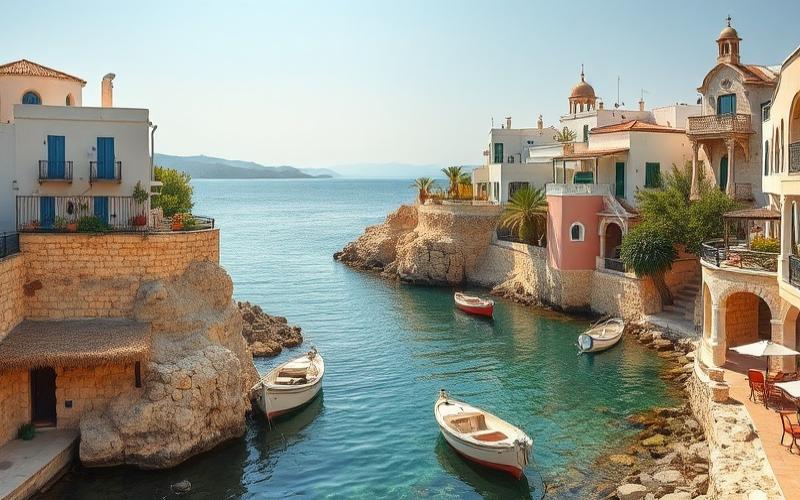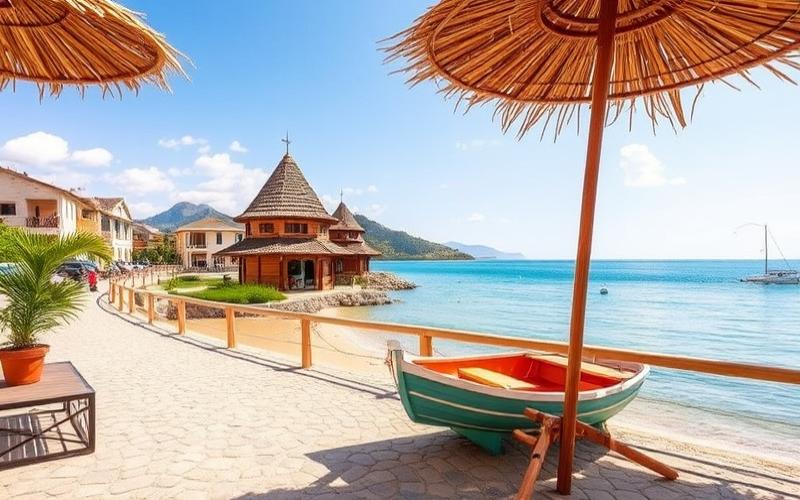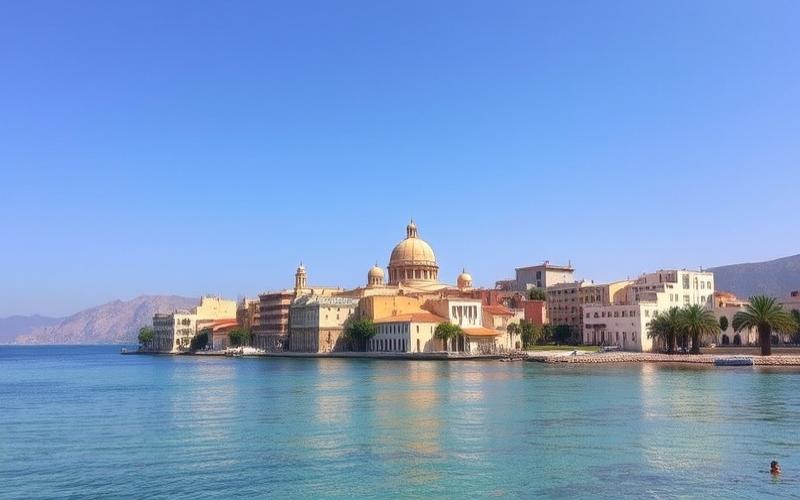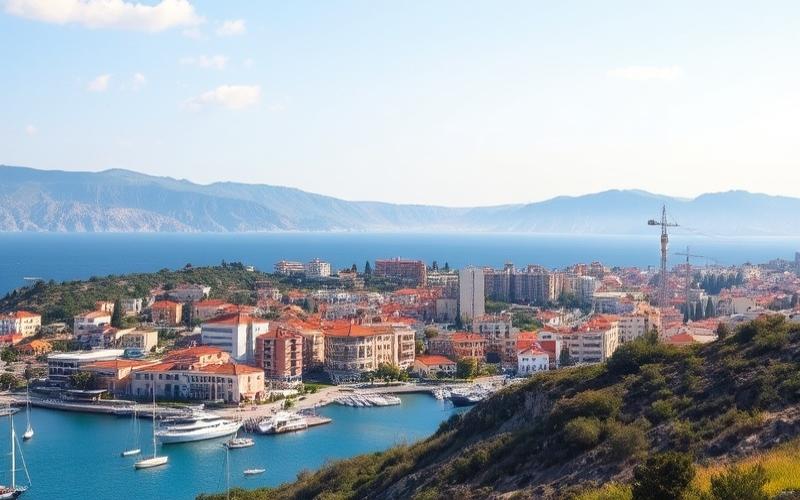
 Published on and written by Cyril Jarnias
Published on and written by Cyril Jarnias
Amid rising real estate prices and the ever-increasing cost of living, micro-apartments in Cyprus are emerging as an innovative and practical solution for those looking to settle down without breaking the bank. These compact, well-designed spaces not only offer an affordable alternative but also meet the growing needs of an island population seeking flexibility and comfort.
By incorporating modern designs and smart storage solutions, these minimalist homes are increasingly captivating young professionals, students, and expatriates. This trend, reflecting the adoption of contemporary lifestyles, could well transform the Cypriot real estate market and offer a new way of thinking about urban living.
Introduction to Micro-Apartments in Cyprus: A Growing Trend
A micro-apartment, also known as a microflat, micro-condo, or micro-unit, is a self-contained single-room living space, typically designed specifically to incorporate a living area, sleeping area, bathroom, and kitchenette within a floor area ranging from 14 to 32 square meters. This real estate trend, gaining popularity in urban centers across Europe, Japan, Hong Kong, and North America, is beginning to take root in Cyprus in response to current housing challenges.
Micro-apartments are distinguished by several essential characteristics. Their floor area is typically under 30m², making them significantly smaller than traditional apartments. They are often offered furnished with fixtures adapted to their reduced size: Murphy beds, futons, fold-down tables, and compact or concealed appliances. Space optimization is pushed to the smallest nooks, transforming every square centimeter into functional space.
Unlike classic studios, residents of micro-apartments may have access to shared spaces like communal kitchens, shared bathrooms, patios, rooftop gardens, gyms, or terraces. These communal amenities compensate for the reduced size of private spaces and foster social interactions among residents.
| Characteristics | Micro-Apartment | Traditional Apartment |
| Floor Area | 14-32 m² | >30 m² |
| Layout | Optimized, Multifunctional | Standard |
| Furnishings | Often Included | Rarely Included |
| Shared Spaces | Numerous | Limited |
| Location | City Center | Variable |
In Cyprus, the emergence of micro-apartments responds to several socio-economic factors. Increasing urbanization, particularly in cities like Nicosia and Limassol, creates significant real estate pressure. Faced with rising prices in urban centers, these small dwellings represent an affordable solution for getting closer to the city center without compromising one’s budget.
Evolving lifestyles also contribute to this trend. Young professionals, students, and expatriates often prioritize proximity to their workplace or place of study over the size of their home. Increased mobility and shrinking household sizes make these compact spaces particularly suited to contemporary needs.
The economic benefits of micro-apartments are significant for Cypriot residents. Besides generally more affordable rent, these homes help reduce energy costs due to their small size. Many micro-apartments also include electricity and internet charges in the rental contract, simplifying occupants’ budget management. For investors, they represent an interesting opportunity due to their potentially high rental yield.
However, living in a micro-apartment presents certain challenges. The limited space can create a feeling of confinement and restrict the possibility of hosting guests. Storage is often a major challenge, requiring constant discipline and forced minimalism. Proximity to neighbors in shared spaces can also create tension if community living rules are not respected.
For Cypriot real estate developers, the challenge is to create micro-apartments that maximize comfort despite spatial constraints. The focus is on material quality, furniture ergonomics, and intelligent layout to transform these “micro-spaces” into genuine “maxi-comfort.”
- Advantages of Micro-Apartments in Cyprus:
- Financial accessibility in desirable urban areas
- Proximity to activity centers and reduced commute times
- Reduced utility bills, sometimes included in the rent
- Ease of maintenance and cleaning
- Reduced ecological footprint
This emerging trend reflects a pragmatic adaptation to the realities of the contemporary Cypriot real estate market, where space maximization and functional optimization are becoming priorities to meet the needs of an evolving urban population.
Good to Know:
Micro-apartments in Cyprus, typically measuring between 20 and 35 m², are characterized by an optimized design that maximizes space usage, often with modular furniture and ingenious storage solutions. They include modern amenities such as compact kitchen equipment and access to high-speed internet. The growing demand for these homes stems from rapid urbanization and a changing lifestyle, favoring an increased reliance on more compact housing. According to a recent local study, these spaces now represent 15% of new residential constructions in Nicosia. Beneficial for those wishing to reduce their living costs, they are financially attractive and practical for young professionals. However, living in these confined spaces poses challenges, such as lack of privacy and storage, requiring daily adaptation but offering a viable alternative in the face of rising traditional housing costs.
The Advantages of Investing in Studios in Cyprus
Studios in Cyprus offer numerous advantages for real estate investors, particularly in the current economic context and in light of evolving market trends.
Favorable Economic Aspects:
- Advantageous Taxation:
- Reduced VAT at 5% for first-time buyers on the first 130 m² of a primary residence (up to €350,000).
- No inheritance tax.
- Attractive tax regime for non-domiciled residents: exemption on worldwide dividends, low taxation on rental income.
- Relatively Low Acquisition Costs:
- Average price per square meter lower than other Mediterranean destinations (approximately €2,500/m² in Limassol).
- Low Annual Property Tax (0.1–0.2% of the property value).
Tourism Growth and Increased Rental Demand:
Tourism remains a key driver of the Cypriot economy with a steady increase in visitor numbers in recent years.
This tourist influx generates strong demand for temporary accommodations such as studios and micro-apartments, particularly sought after by short-stay travelers, students, or young professionals.
High Potential Yields Through Short-Term Rentals:
| Investment Type | Estimated Annual Rental Yield |
|---|---|
| Urban Studios | >10% |
| Seasonal Rentals | 6–7% |
Compact apartments located in urban or tourist areas thus display some of the highest yield rates in the country. The growing popularity of short-term rental platforms further amplifies this potential.
Incentive Government Policies:
- Easier acquisition of permanent residency status with a minimum real estate investment (€300,000).
- Ongoing support for urban projects and infrastructure that boost residential and commercial attractiveness.
Strategic Mediterranean Location:
Cyprus benefits from an ideal location between Europe, Asia, and Africa. This geographical position strengthens its role in international trade as well as its air connectivity with several major Mediterranean cities.
Recent Real Estate Market Evolution & New Preferences:
The Cypriot market is experiencing steady growth (+1.5% year-on-year), driven by:
- A marked trend towards urban compactness: the rise of small dwellings meeting current expectations – flexibility, simplified management, and reduced cost.
- A diverse international clientele attracted by local economic stability and environmental quality.
Key Takeaway: Investing in a studio in Cyprus combines advantageous taxation, accessible prices compared to the rest of the Mediterranean basin, a strong tourism dynamic generating high yields in the short-term segment, and a stable political environment favorable to welcoming foreign investors.
Good to Know:
Investing in studios in Cyprus presents many interesting economic advantages, including relatively low acquisition costs and attractive tax benefits. The continuous growth of tourism on the island, reinforced by its strategic location in the Mediterranean, stimulates strong demand for temporary housing like studios, translating into high rental yields, particularly in the short-term rental market. Government policies also favor these investments, with incentives to attract foreign capital into real estate. Furthermore, the evolving Cypriot market is moving towards more compact living spaces, thereby meeting new consumer preferences for livable and affordable solutions.
Microliving in Cyprus: A Lifestyle Adapted to Small Budgets
The concept of microliving is based on creating compact living spaces, typically under 30 square meters, optimized to provide all daily necessities: sleeping area, functional kitchen, and bathroom. This housing trend fits into a global movement driven by individualization, urban densification, and the search for economic alternatives to the housing crisis. In Cyprus, where real estate prices are continuously rising and the rental market remains tight in major cities like Nicosia or Limassol, microliving appears as a solution particularly suited to people with limited budgets.
Concrete Examples of Microliving in Cyprus:
- In Nicosia: buildings offer furnished micro-apartments with access to shared spaces (gym, coworking), targeting students and young professionals.
- In Limassol: some projects incorporate smartly arranged studios (20-28 m²) in neighborhoods close to the city center.
- In tourist areas like Larnaca or Paphos: mobile tiny houses are also found, used as primary or secondary residences.
Comparison Table: Micro-Apartments vs. Traditional Housing:
| Criterion | Micro-Apartment | Traditional Housing |
|---|---|---|
| Average Area | 20-30 m² | 60 m²+ |
| Construction Cost/m² | Low | High |
| Monthly Charges | Reduced | Higher |
| Maintenance | Easy/Quick | More Costly |
Reduced Costs are a Major Asset of Microliving:
- Less expensive construction due to limited area
- Low maintenance fees
- Integrated furniture optimizing every corner
In the current Cypriot rental market:
- Average rents have significantly increased in recent years; a traditional studio often rents for around €600 per month in the city center.
- Micro-homes offer a lower entry point (€400–500/month), allowing those with small budgets to access well-located housing.
Practical Daily Advantages for Residents:
- Space maximization through multifunctional layout (retractable furniture, built-in storage)
- Notable decrease in energy expenses (heating/cooling adapted to small volume)
- Less time spent on cleaning
List of Positive Social and Environmental Impacts:
- Promotes access to urban housing for all
- Encourages a minimalist lifestyle limiting overconsumption
- Significantly reduces individual carbon footprint compared to classic housing
- Strengthens social ties via shared spaces integrated into some complexes
Thus, microliving embodies a pragmatic response to current economic and ecological challenges while offering residents flexibility and comfort.
Good to Know:
The concept of microliving translates into the creation of ultra-compact homes, offering an optimal economic solution for small budgets in Cyprus. With notable examples in Limassol and Nicosia, these micro-apartments, while modest in size, maximize space efficiency while offering more affordable rents, and are attractive in a rental market where costs are increasing. The construction and maintenance of these units are financially advantageous compared to traditional housing, presenting significant reductions in utility bills due to lower energy consumption. Socially and environmentally, microliving promotes minimalist and eco-friendly lifestyles, reducing the overall carbon footprint while strengthening community through shared common spaces.
Disclaimer: The information provided on this website is for informational purposes only and does not constitute financial, legal, or professional advice. We encourage you to consult qualified experts before making any investment, real estate, or expatriation decisions. Although we strive to maintain up-to-date and accurate information, we do not guarantee the completeness, accuracy, or timeliness of the proposed content. As investment and expatriation involve risks, we disclaim any liability for potential losses or damages arising from the use of this site. Your use of this site confirms your acceptance of these terms and your understanding of the associated risks.

















































